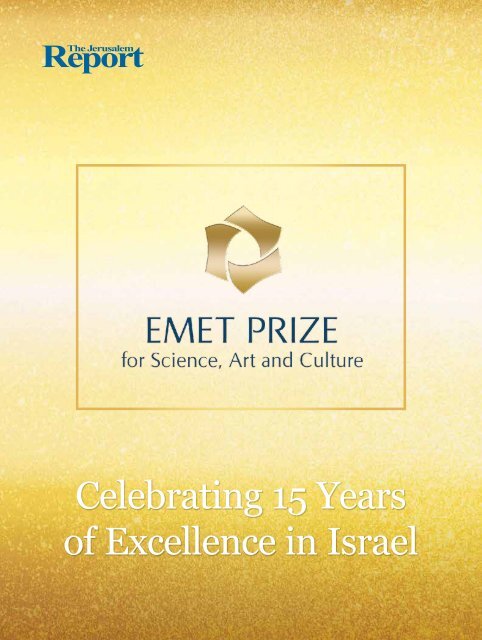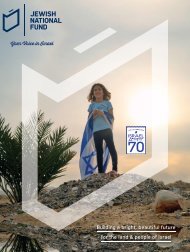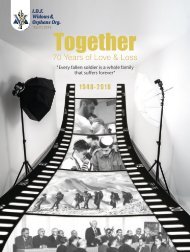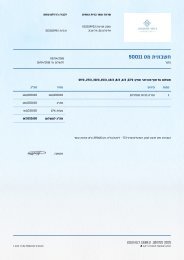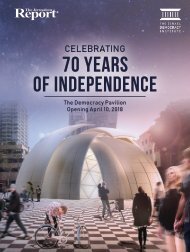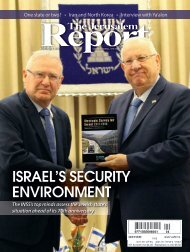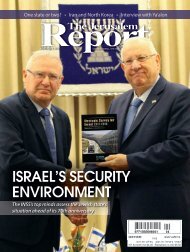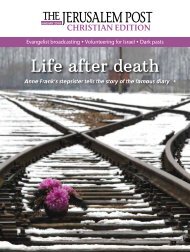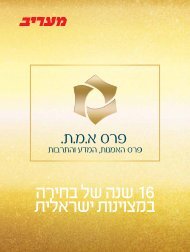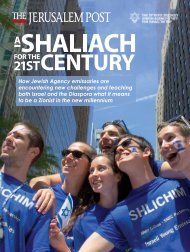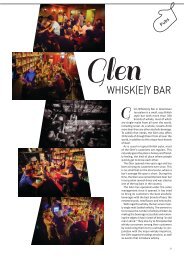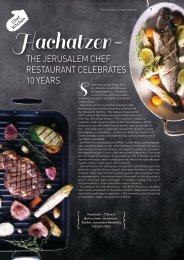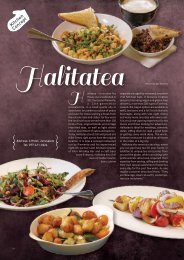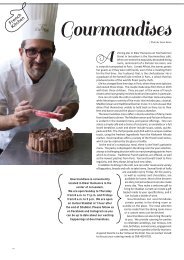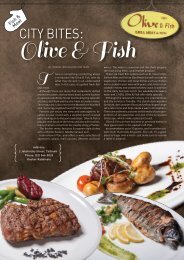You also want an ePaper? Increase the reach of your titles
YUMPU automatically turns print PDFs into web optimized ePapers that Google loves.
Report<br />
The Jerusalem<br />
Celebrating 15 Years<br />
of Excellence in Israel
Greetings from committee heads 3<br />
The man behind the prize 4<br />
NOA AMOUYAL<br />
The joy of the prize 5<br />
ILANA ASHKENAZI <br />
Table of contents<br />
The truth about winning 8<br />
MAAYAN JAFFE-HOFFMAN<br />
Honoring outstanding contributions 12<br />
YONAH JEREMY BOB<br />
2016 prize winners 14<br />
A spotlight on Israel’s two scientific pioneers 6<br />
JUDY SIEGEL-ITZKOVICH<br />
A look at the <strong>EMET</strong> Prize committee 16<br />
A word from the Prime Minister Netanyahu<br />
I<br />
congratulate you on receiving the <strong>EMET</strong><br />
prize for your impressive achievements<br />
in the fields of research and innovation,<br />
and for your contributions to our society.<br />
The State of Israel is proud of you and your<br />
work, which has added greatly to our quality<br />
of life.<br />
At the foundation of our existence as a<br />
people is the desire to merge the old and the<br />
new: the legacy of our ancestors combined<br />
with the modern values of progress and<br />
enlightenment, with breakthrough discoveries<br />
in the fields of science and technology.<br />
As prize winners, you represent the great<br />
vision, whose essence connects the roots<br />
of the tree to the topmost branches. Each<br />
and every one of you adds a unique thread<br />
to complete the tapestry of our Jewish and<br />
democratic, progressive and peace-loving<br />
State.<br />
Wisdom and reason are not traits that are<br />
simply inherited, but must be constantly<br />
nurtured. I know that each of you, without<br />
exception, has reached the summit by<br />
climbing up step by step. There are no short<br />
cuts on the journey to excellence, only aching<br />
muscles and beads of perspiration along<br />
the way. But the view from the mountain<br />
peak makes all the hard work worthwhile.<br />
Not only are the people of Israel benefiting<br />
from your discoveries and developments,<br />
but the entire world; many countries<br />
throughout the world appreciate our desire<br />
to make the world a better place for all<br />
humanity, and as a result foster closer ties<br />
with Israel.<br />
I wish you many more fruitful endeavors,<br />
which stem from the joy of<br />
creating, and the perpetual<br />
aspiration to expand your<br />
knowledge.<br />
Magazine Editor: NOA AMOUYAL<br />
Copy Editor: YAKIR FELDMAN<br />
Graphics: KIYOSHI INOUE<br />
Cover: KIYOSHI INOUE<br />
Images from Kobi Kalmanovitz<br />
and Dudi Salem unless otherwise stated.<br />
RONIT HASIN-HOCHMAN,<br />
CEO, The Jerusalem Post Group<br />
YAAKOV KATZ,<br />
Editor-in-Chief<br />
REUT LEVY-LAURSEN,<br />
Manager of Business Development<br />
Editorial Offices and Administration<br />
The Jerusalem Post Building<br />
PO Box 81, 206 Jaffa Road, Jerusalem 9100002<br />
Telephone: +972 2 531 5666 Fax: +972 2 538 9527<br />
Subscriptions Email: subs@jpost.com<br />
Advertising Email: ads@jpost.com<br />
www.jpost.com<br />
2
The significance of the <strong>EMET</strong> prize<br />
Award Committee member<br />
Chairman of the Israel Federation<br />
of Bi-National Chambers of Commerce and Industry<br />
JAIME ARON<br />
“The prize, for me, means, first of all, the strength of the ties,<br />
the natural and profound and true ties, between the Jewish<br />
people from the Diaspora with the State of Israel. Second, it<br />
means, for me, that we are supporting the fight for excellence<br />
in Israel. Third, by giving the prize, we recognize the<br />
excellence of those people in Israel who receive the prize.”<br />
Award Committee member<br />
General Legal Counsel to the Prime Minister’s Office<br />
“[This prize represents] academic achievement at<br />
the highest level. We look for unique contributions<br />
– whether their achievements will serve society as a<br />
whole as much as possible."<br />
SHLOMIT BARNEA FARGO<br />
<br />
Award Committee member<br />
Chairman of the National R&D Council<br />
“Emet is a Hebrew acronym for omanut (art), mada (science) and<br />
tarbut (culture). Which means it is everything. It’s not only in the<br />
sciences or only in academics. For me, I would like the public to<br />
speak about people who did something significant for the society<br />
or the state, and not only football players or singers.”<br />
MAJOR GENERAL (Ret)<br />
PROF. ISAAC BEN ISRAEL<br />
Award Committee member<br />
Head of the Prime Minister’s Office National Economic Council<br />
"The prime minister gives out very few prizes. We know that<br />
whoever wins the <strong>EMET</strong> prize, usually goes on to win the Israel<br />
Prize. That’s because the <strong>EMET</strong> prize is very important. I’m very<br />
proud to be part of the award committee. The winners are<br />
exceptional, because they are the best in their fields - they give<br />
something to humanity, to the public. The <strong>EMET</strong> Prize is an<br />
opportunity for the public to openly acknowledge their efforts."<br />
AVI SIMHON<br />
The Jerusalem<br />
Report<br />
May <strong>2017</strong><br />
3
The man<br />
behind<br />
the prize<br />
ALBERTO MOSCONA<br />
A father figure – a modest, but generous philanthropist and<br />
a lover of Israel – Arie Dubson reminisces about <strong>EMET</strong> prize<br />
co-founder, the late Alberto Moscona<br />
• By NOA AMOUYAL<br />
When Alberto Moscona,<br />
an immigrant from<br />
Mexico, made aliya in<br />
1949, his stay in Israel barely lasted<br />
a year. His love of Israel, though, remained<br />
eternal.<br />
“Alberto Moscona was an example<br />
of the old guard,” Arie Dubson,<br />
Chairman of the A.M.N. Foundation,<br />
says with a smile as he talks<br />
about his friend, colleague and<br />
mentor.<br />
“He was born before Israel was<br />
born; a Jew without a state.”<br />
Although he loved Israel from<br />
afar – specifically from his hometown<br />
of Mexico City – Moscona<br />
never ceased contributing to the<br />
Jewish state. In addition to the $1<br />
million <strong>EMET</strong> prize that has been<br />
awarded annually since 2002, the<br />
optometrist donated millions of<br />
dollars to Ben-Gurion University<br />
of the Negev, the Hebrew University<br />
in Jerusalem, the Weizmann<br />
Institute of Science, Haifa and Tel<br />
Aviv Universities, and the Medical<br />
Centers Assaf Harofeh and Rambam<br />
for many years.<br />
Currently, the prize money sits<br />
in a trust that – at a minimum –<br />
generates the $1 million prize that<br />
is divided among five categories:<br />
exact sciences, life sciences, social<br />
sciences, humanities, Judaism and<br />
art.<br />
Any extra money in any given<br />
year is given to scientific institutions<br />
in Israel.<br />
For decades, Moscona made<br />
these donations in secret.<br />
“Alberto never wanted people to<br />
know he was a donor. Every project<br />
he ever contributed to in Israel,<br />
was done anonymously,” Dubson<br />
explains.<br />
Accordingly, Dubson’s attempts<br />
to name the prize the “Alberto<br />
Moscona Prize,” were rebuked and<br />
instead it was given the acronym<br />
A.M.N. Foundation (Alberto Moscana<br />
Nissim), so Moscona’s identity<br />
would still be able to remain<br />
somewhat anonymous.<br />
Growing up, Moscona was transfixed<br />
by the Nobel Prize and always<br />
wondered why more Israelis were<br />
not let into that exclusive club.<br />
Dubson is not sure where his affinity<br />
for the Nobel Prize stemmed<br />
from, but speculates that his lack<br />
of a formal education may have<br />
fueled his desire to award excellence<br />
for those who pour themselves<br />
into their studies.<br />
“Unlike other prestigious prizes<br />
in Israel, this prize is exclusively for<br />
Israelis,” Dubson notes.<br />
Although the <strong>EMET</strong> prize is<br />
now celebrating its 15th year, the<br />
path to creating the prize wasn’t<br />
a smooth one. In search for a government<br />
seal of approval, the idea<br />
for the prize was initially rejected<br />
by the president, who was Ezer<br />
Weizman at the time. When Dubson<br />
and Moscana approached Benjamin<br />
Netanyahu during his first<br />
stint as prime minister, he approved<br />
of the idea.<br />
When the government changed<br />
hands and Ehud Barak became<br />
prime minister, the process slowed<br />
to a near halt after Barak signed the<br />
agreement, but, eventually, after<br />
much hand-wringing and ultimatums,<br />
the first prize was awarded by<br />
Ariel Sharon.<br />
For Dubson, overseeing the <strong>EMET</strong><br />
prize is one of the two hats he<br />
wears. As founder of Voyage Capital<br />
4
Partners – a hedge fund management<br />
company – Dubson’s work at<br />
the <strong>EMET</strong> prize is his way of giving<br />
back to Israel.<br />
“I always felt it was not enough to<br />
live in Israel – I wanted to contribute<br />
beyond paying taxes. When [Alberto]<br />
said he had the idea of the prize,<br />
I saw it as a way to do that,” Dubson,<br />
who made aliya from Mexico when<br />
he was 24, says.<br />
“This was my way of giving back. It<br />
rewards excellence. The <strong>EMET</strong> Prize<br />
is the Zionist element of my life and<br />
Voyage Capital feeds me and pays<br />
the <strong>EMET</strong> prize bills,” he smiles.<br />
For Dubson, Moscona represents<br />
something unique about immigrants<br />
from his generation: the<br />
unwavering desire to perpetually<br />
give to the State of Israel.<br />
“Alberto’s generation – the ones<br />
who didn’t come to Israel, became<br />
big donors. In Israel, we didn’t live<br />
up to being so generous. There isn’t<br />
a big culture of giving here,” he<br />
laments, saying that most Israelis<br />
donate, but not in the same league<br />
as Jews in the Diaspora.<br />
“Jews in the Diaspora need to feel<br />
a link. Israelis here, we go to the<br />
army, we [already] give a lot to Israel,”<br />
he explains.<br />
At times, Dubson is asked why the<br />
prize rewards those who are already<br />
very successful.<br />
Dubson is quick to note the subject<br />
of nominations is out of his<br />
hands – the eight-person committee<br />
is presented with nominations and<br />
does not come up with the names<br />
themselves. Further, he notes that<br />
the prize is intended to reward<br />
someone at the pinnacle of his or<br />
her career.<br />
Why is rewarding excellence so<br />
important to the Jewish people,<br />
especially those in the diaspora?<br />
Dubson brushes off notions<br />
of tikun olam – healing the world.<br />
Instead, he believes recognizing and<br />
paying tribute to extraordinary work<br />
is an internal drive prevalent among<br />
the Jewish people.<br />
“I don’t believe in tikun olam. We<br />
have a tradition of studying and<br />
excellence; we needed it to survive.<br />
This is an internal drive for us,” he<br />
asserts.<br />
Whether the needs are external or<br />
internal, <strong>EMET</strong> has spent the past 15<br />
years awarding the best of the best<br />
in Israel and hopes to do so for years<br />
to come.<br />
ILANA ASHKENAZI<br />
The joy of<br />
the prize<br />
I’ve been with the <strong>EMET</strong> Prize<br />
for 13 years. It is my pride and<br />
joy.<br />
It is no coincidence that I refer<br />
to the award in adjectives that<br />
are used by parents when they<br />
talk about their children. It is a<br />
great privilege and a tremendous<br />
commitment to take part in such<br />
an important project; to preserve<br />
and nurture the prize and to<br />
ensure that it thrives and meets<br />
the expectations of its founders.<br />
Every year, I am amazed to<br />
see the incredible names of<br />
suggested nominees that are<br />
presented. For such a small<br />
country, Israel has many worthy<br />
candidates who are engaged in<br />
important and exemplary work.<br />
To my dismay, some of the<br />
candidates are not as well<br />
known, despite their great work.<br />
Every year, mind boggling<br />
academic breakthroughs and<br />
talented artists emerge and<br />
the public is not aware of<br />
their existence. As such, I feel<br />
compelled to share the work of<br />
these nominees with the entire<br />
public - to make the entire Jewish<br />
people realize how much good is<br />
happening in Israel.<br />
<br />
Ilana Ashkenazi<br />
<br />
Director, <strong>EMET</strong> Prize<br />
The Jerusalem<br />
Report<br />
May <strong>2017</strong><br />
5
RUTH ARNON (Wikimedia Commons)<br />
MICHAEL SELA (Wikimedia Commons)<br />
A spotlight on Israel’s<br />
two scientific pioneers<br />
• By JUDY SIEGEL-ITZKOVICH<br />
Prof. Michael Sela and Prof.<br />
Ruth Arnon – both world-renowned<br />
scientists – have<br />
worked together for six decades,<br />
she originally as his student at the<br />
Weizmann Institute of Science and<br />
then as his research partner and<br />
friend.<br />
Today, he at 93 and she at 84<br />
years of age, both continue to<br />
work in their Weizmann labs – and<br />
they are together members of a<br />
eight-person Award Committee<br />
appointed by the prime minister<br />
and the A.M.N. Foundation for the<br />
Advancement of Science, Art and<br />
Culture responsible for a unique<br />
award.<br />
The <strong>EMET</strong> Prize is a $1 million<br />
annual prize given for excellence in<br />
academic and professional achievements<br />
by the A.M.N. Foundation.<br />
It was endowed in 1999 by the late<br />
Alberto Moscona Nisim, a Mexican<br />
friend of Israel who objected to the<br />
fact that, at that time, no Israeli scientists<br />
had received Nobel Prizes.<br />
“This was before Prof. Avraham<br />
Hershko and Prof. Aaron Ciechanover<br />
(along with US scientist<br />
Irwin Rose) received the 2004<br />
Nobel Prize for the discovery of<br />
ubiquitin-mediated protein degradation,”<br />
she pointed out.<br />
Sela is working on fighting cancer,<br />
while Arnon is busy both on an<br />
anti-cancer vaccine and developing<br />
a universal influenza vaccine<br />
that would not have to be injected<br />
every year.<br />
Together, however, along with<br />
the late Dvora Teitelbaum, they<br />
developed over many years the<br />
blockbuster drug to alleviate multiple<br />
sclerosis (MS) named Copaxone.<br />
Originally called COP-1, it<br />
was shown in their lab to efficiently<br />
suppress experimental autoimmune<br />
encephalomyelitis – an animal<br />
model of brain inflammation<br />
– and to be clinically beneficial<br />
in MS. It has since helped many<br />
hundreds of thousands of patients<br />
around the world by reducing the<br />
number and severity of neurological<br />
attacks.<br />
In MS, the body’s immune system<br />
plunders and damages the<br />
myelin sheath surrounding nerves<br />
in the brain and spinal cord that<br />
constitute the central nervous<br />
system. Acting like insulation on<br />
electrical wires, the myelin sheath<br />
facilitates the conduction of nerve<br />
signals along pathways. But when<br />
it is degraded, nerve signals are<br />
weakened or silenced, resulting in<br />
impaired functioning of systems<br />
that those nerves serve. “When<br />
we started the research, we didn’t<br />
6
even dream of discovering a<br />
drug,” Arnon – Weizmann’s Paul<br />
Ehrlich Professor of Immunology<br />
– recalled.<br />
“I have been on the committee<br />
for several years. Michael asked<br />
me to join, and I did. Michael has<br />
been here since the beginning,”<br />
Arnon said in an interview with<br />
The Jerusalem Post. “It’s very hard<br />
for me to say ‘no’ to Michael. I am<br />
very busy,” said Arnon, who until a<br />
year ago was president of the prestigious<br />
Israel Academy of Sciences<br />
and Humanities in Jerusalem.<br />
“There are meetings and decisions<br />
to be made, but they don’t take too<br />
much time.”<br />
The members of the committee<br />
first have to pick the exact fields for<br />
which the <strong>EMET</strong> Prize will be given<br />
that year. “Then we have to choose<br />
the three-member panels of judges<br />
in each field. The general categories<br />
are the exact sciences, life sciences,<br />
social sciences, humanities<br />
and Judaism, and art and culture.<br />
For example, a number of years<br />
ago, an outstanding journalist was<br />
chosen for the social sciences category.<br />
“Every year,” said Arnon, “the<br />
judges are different. There has<br />
to be at least one women on the<br />
three-member panel. I remember<br />
one year in which there were three<br />
women on a panel, but they picked<br />
a man to win the prize.”<br />
The committee then meets<br />
to give the judges directives and<br />
receive their decisions and decide<br />
whether to approve them. “I don’t<br />
remember there having been disagreements<br />
when the winners are<br />
finally chosen.”<br />
Usually, one outstanding individual<br />
receives a whole prize and<br />
doesn’t have to share it with someone<br />
“unless they collaborated or<br />
worked on two aspects of the same<br />
subject and complemented each<br />
other,” Arnon said. “There is no<br />
age limit to the candidates, but<br />
they must all be Israelis or at least<br />
live in Israel.”<br />
Arnon added: “The chairman of<br />
the Award Committee is always<br />
a retired judge. It was previously<br />
Judge Ya’acov Kedmi, who died last<br />
year, so another judge must be chosen<br />
by the prime minister, who has<br />
been very busy. In the meantime,<br />
there is a temporary replacement.”<br />
In any case, the prime minister<br />
always attends the festive award<br />
ceremony, usually in the fall, at the<br />
Jerusalem Theater.<br />
Despite the prime minister’s<br />
involvement, the procedure is apolitical<br />
– which cannot always be<br />
said about the process in which<br />
winners of the Israel Prizes are<br />
selected.<br />
“The percentage of women who<br />
have received the <strong>EMET</strong> Prize since<br />
its founding has been relatively<br />
low. We can’t tell the judges whom<br />
to choose, but we would be pleased<br />
if there are more women laureates,”<br />
Arnon said.<br />
Asked how the <strong>EMET</strong> Prize is<br />
unique, the Weizmann Institute<br />
scientist said that “the Israel Prize<br />
is very prestigious, but it does not<br />
include all the subjects that the<br />
<strong>EMET</strong> Prize does, including prizes<br />
in the arts and culture such as theater,<br />
music and dance.” In addition,<br />
the <strong>EMET</strong> Prize awards much more<br />
money. The Wolf Prize, which is<br />
often called “Israel’s Nobel Prize”<br />
and which both Sela and Arnon<br />
have received, is awarded more<br />
to foreigners than to Israelis. The<br />
<strong>EMET</strong> Prize, she said, “gives more<br />
of a chance for very accomplished<br />
individuals to get the recognition<br />
they deserve. And it is very well<br />
run.”<br />
WHILE ARNON is a recipient of the<br />
Israel Prize and has served as dean<br />
of the biology faculty at Weizmann<br />
as well as its vice president, Sela<br />
served as president of the outstanding<br />
Rehovot institute.<br />
Sela is acclaimed for his immunology<br />
research, especially for his<br />
research on synthetic antigens –<br />
molecules that trigger the immune<br />
system to respond. This led to the<br />
discovery of the genetic control of<br />
the immune response, as well as<br />
to the design of vaccines based on<br />
synthetic molecules.<br />
His joint research with Arnon on<br />
Copaxone took a long time: “We<br />
started with a theoretical study<br />
in 1967, but our results, including<br />
on monkeys, were published only<br />
eight years later. We then conducted<br />
the first clinical trial, which was<br />
published in 1977.”<br />
The drug’s development was<br />
taken over by Israel’s Teva Pharmaceutical<br />
Company in 1987, and<br />
it took nine years to be approved<br />
by the drug authorities here and<br />
abroad. “We spent 29 years working<br />
together on Copaxone. Developing<br />
a drug like this takes tremendous<br />
patience and a long life,”<br />
both of which he and Arnon have<br />
enjoyed.<br />
Sela has been on the Award Committee<br />
since the <strong>EMET</strong> Prize was<br />
established, even he did not know<br />
the Mexican-Jewish donor. “I was<br />
a member of the selection committee<br />
for the Israel Prize several times,<br />
but never was involved in choosing<br />
outstanding people in the arts.”<br />
Amazingly, he himself received the<br />
Israel Prize in 1959, when he was<br />
only 35 years old.<br />
His second wife, Sarah, who is<br />
74, was introduced to Sela by Ariel<br />
Sharon and his wife Lily, not long<br />
after Sela’s first wife, Margalit, suddenly<br />
died of a heart attack. “She is<br />
my driver, taking me to Jerusalem<br />
and elsewhere. But she is also very<br />
busy in the executive of the Israel<br />
Opera. I don’t know even how to<br />
read musical notes.”<br />
Sela recalls having a lot of satisfaction<br />
when outstanding mathematicians,<br />
physicists and other<br />
scientists received the <strong>EMET</strong> Prize.<br />
The ceremonies have usually been<br />
without controversy, but he does<br />
recall when author David Grossman<br />
– whose son was killed in the<br />
Lebanon War – refused to shake the<br />
hand of then-prime minister Ehud<br />
Olmert. “Olmert accepted his decision,”<br />
the scientist said.<br />
Sela concludes that “life is never<br />
boring for me. I read, travel and<br />
work in the lab. Being busy is the<br />
only way to be at my age.”<br />
The Jerusalem<br />
Report<br />
May <strong>2017</strong><br />
7
DAN SHECHTMAN (2011)<br />
The truth about winning<br />
<strong>EMET</strong> Prize awardees strive to make excellence a way of life<br />
• By MAAYAN JAFFE-HOFFMAN<br />
Photos: Reuters<br />
The intention of the Alberto<br />
Moscona Nissim Foundation’s<br />
<strong>EMET</strong> Prize is to<br />
“acknowledge those who view<br />
excellence as a way of life, and the<br />
fulfillment of human potential as<br />
essential to creating a better world<br />
for future generations,” according<br />
to Moscona. The annual prize is<br />
awarded for excellence in academic<br />
and professional achievements that<br />
have far-reaching influence and<br />
have made a significant contribution<br />
to society in Israel.<br />
How can excellence be a way of<br />
life? Do prize winners really change<br />
the world?<br />
Looking at the legacies of several<br />
winners, including those who won<br />
not only the <strong>EMET</strong> Prize but also a<br />
Nobel Prize, the answers to these<br />
questions are evident.<br />
TAKE PROF. DAN SHECHTMAN,<br />
who earned an <strong>EMET</strong> Prize in exact<br />
sciences in 2002 and a Nobel Prize<br />
in chemistry in 2011. A professor<br />
at Haifa’s Technion-Israel Institute<br />
of Technology, Shechtman won his<br />
awards for creating a new branch<br />
of science through his discovery<br />
in 1982 that while crystals may be<br />
ordered materials, their atomic order<br />
can be quasi-periodic rather than<br />
periodic.<br />
Since then, quasi-periodic materials<br />
have developed into an exciting<br />
interdisciplinary science with modern<br />
application, including improving<br />
processes such as 3D printing,<br />
whose applications can be both<br />
industrial and life-saving.<br />
However, Shechtman does not<br />
believe that being “the father of the<br />
science of quasi-period materials,”<br />
as he is known around the world,<br />
will ultimately be his legacy. Rather,<br />
he hopes that he will be remem-<br />
8
KING CARL XVI Gustaf of Sweden walks down the stairs<br />
with Ada Yonath, the 2009 Nobel Prize winner in<br />
Chemistry (and who won an <strong>EMET</strong> Prize in 2006), as<br />
they arrive for the Nobel Banquet in Stockholm that year.<br />
AARON CIECHANOVER (2004)<br />
AVRAHAM HERSHKO (2004)<br />
bered for his international advocacy<br />
for increased science education and<br />
technological entrepreneurship,<br />
which he sees as key to world peace<br />
and prosperity.<br />
“A prize is a good way of becoming<br />
famous or leaving a legacy, but<br />
it is not enough,” says Shechtman,<br />
who last year alone visited 30 countries<br />
and gave well over 100 lectures<br />
promoting education. He also meets<br />
with world leaders in an attempt<br />
to convince them that education<br />
should be the No. 1 job of every<br />
government.<br />
“The most important natural<br />
resource of every country is not oil<br />
or minerals; it is human ingenuity,”<br />
says Shechtman. “It is sustainable<br />
and it will last forever, but you have<br />
to develop it.”<br />
At home in Israel, Shechtman is<br />
likewise influencing society in a<br />
deep way.<br />
He says, “I am a Zionist. My mother<br />
was born in Israel. My grandfather<br />
came here on the Second Aliya<br />
and was among those who built this<br />
country from scratch. I carry with<br />
me this heritage, and I try to contribute<br />
to Israel as much as I can, in what<br />
I can do best.”<br />
Right now, Shechtman is advocating<br />
early scientific education and<br />
later on technological innovation<br />
in the Jewish State. He has worked<br />
with the mayor of Haifa to launch<br />
several scientific kindergartens that<br />
are picking up traction across Israel.<br />
Moreover, he teaches a class on<br />
technological entrepreneurship at<br />
the Technion, which is designed to<br />
encourage graduates to open startups.<br />
Over the last 30 years, 25% of<br />
class graduates have opened startups.<br />
“My theory is that a child who<br />
understands the world around him<br />
or her will like science because he or<br />
she will understand science and vice<br />
versa,” says Shechtman. “Once you<br />
The Jerusalem<br />
Report<br />
May <strong>2017</strong><br />
9
(L-R) 2005 NOBEL <strong>PRIZE</strong> laureates<br />
Roy Glauber of the United States,<br />
John Hall of the United States.,<br />
German Theodor Hansch, French Yves<br />
Chauvin, Robert Grubbs of the United<br />
States, Richard Schrock of the United<br />
States, Australian Barry Marshall,<br />
Australian Robin Warren, Israeli<br />
Robert Aumann and Thomas<br />
Schelling of the United States attend<br />
the award ceremony at the Concert<br />
Hall in Stockholm that year.<br />
embed a love of science in the mind<br />
of young people, they will carry it<br />
with them for the rest of their lives.”<br />
In addition to working at the Technion,<br />
for many years he was a guest<br />
professor at Johns Hopkins University<br />
and the University of Maryland.<br />
PROF. ISRAEL AUMANN, who was<br />
awarded the <strong>EMET</strong> Prize in 2002 for<br />
social sciences and became a Nobel<br />
Laureate in 2005 in economics, says<br />
he, too, wants to contribute to the<br />
State of Israel. He made aliya from<br />
the United States more than 60<br />
years ago “because I was a Zionist.”<br />
Since then, Aumann developed<br />
tools for precise analysis of economic<br />
systems, where groups of participants<br />
exercise significant influence<br />
on the result, while the individual<br />
influence of each participant is very<br />
small. He also helped develop and<br />
establish a new stage of game theory<br />
– the mathematical modeling of<br />
strategic interaction among rational<br />
(and irrational) agents. Specifically,<br />
Aumann formulated the mathematical<br />
underpinning and then proved<br />
that in repeated interactions, there<br />
is more of a tendency to cooperate.<br />
Aumann, who was born in Germany<br />
and raised in New York,<br />
received his doctorate from MIT in<br />
Boston. He says he cannot judge his<br />
contributions – “I’ll let other people<br />
judge my work” – both because he is<br />
modest, but also because he equates<br />
his discoveries with his children.<br />
“You don’t ask which of your<br />
children you are most proud of,”<br />
Aumann notes. “So I don’t think<br />
there is one piece of work that I am<br />
more proud of than any other piece.”<br />
But Aumann has plenty for which<br />
he can be proud. He has innovatively<br />
used his scientific work to play<br />
a role in Israeli society, specifically<br />
leveraging game theory to help<br />
understand the Talmud and Jewish<br />
law in depth.<br />
In 2011, Aumann came out against<br />
Israel’s deal with Hamas in exchange<br />
for IDI prisoner Gilad Shalit based<br />
on the commonality between game<br />
theory and Jewish law as it is presented<br />
in the Talmud.<br />
“There is a rule about redemption<br />
of prisoners. The Talmud says<br />
that redemption of prisoners is a<br />
very big mitzva,” explains Aumann,<br />
“but there is also a specific rule in<br />
the Talmud that one should not<br />
redeem prisoners for more than a<br />
reasonable amount, for more than<br />
the going price. Now comes the<br />
game theory part of this: if we do<br />
start redeeming prisoners for large<br />
amounts, then the goyim will run<br />
after us and take more and more<br />
prisoners. What happens if you do x<br />
and then what will happen if other<br />
side does y.”<br />
During the period of negotiation<br />
between Israel and Hamas, Aumann<br />
spoke up against the deal at a Knesset<br />
hearing and tried to stop it from<br />
going through.<br />
“The Shalit redemption was a very<br />
bad idea and we are suffering from it<br />
up until now,” says Aumann.<br />
The professor said he is very proud<br />
to have won both the <strong>EMET</strong> and<br />
Nobel prizes.<br />
“Whatever I try to do, I try to<br />
do perfectly. I don’t always succeed,<br />
but I try. When you are doing<br />
scientific work, to make sure you<br />
do things right, that is a positive<br />
thing,” Aumann says. “The [<strong>EMET</strong><br />
and Nobel] prizes are very prestigious<br />
prizes, and naturally I feel<br />
good about them.”<br />
10
PROF. AVRAHAM HERSHKO has<br />
reason to feel good about his work<br />
and prizes, too.<br />
The 2002 winner of the <strong>EMET</strong><br />
Prize in life sciences and medicine<br />
and a 2004 Nobel Laureate in<br />
Chemistry, Hershko significantly<br />
contributed to the understanding<br />
of regulation processes in the delegation<br />
of intracellular proteins and<br />
the opening of new horizons in<br />
biological and medical research.<br />
Hershko’s most recent work,<br />
studying the roles of the ubiquitin<br />
system in controlling the cell division<br />
process, is playing a key role in<br />
understanding and curing certain<br />
types of cancer.<br />
“My discovery has already<br />
helped mankind, and I hope it will<br />
continue to do so,” says Hershko,<br />
who is an active researcher at the<br />
Technion.<br />
Although Hershko has received<br />
many prizes over the last decades,<br />
he says he is especially “glad to<br />
receive the <strong>EMET</strong> Prize” because it<br />
is an Israeli award.<br />
“It gives me a lot of happiness,”<br />
Hershko says, noting that he<br />
received the <strong>EMET</strong> Prize before<br />
the Nobel Prize, which means the<br />
<strong>EMET</strong> selection committee saw the<br />
importance of his discoveries even<br />
before what is commonly considered<br />
the highest scientific prize.<br />
Hershko was born in Hungary<br />
and immigrated to Israel in the<br />
1950s. He attended Israeli<br />
schools and received<br />
his medical degree<br />
from the Hebrew<br />
University of Jerusalem,<br />
where he<br />
ultimately received<br />
his doctorate in biochemistry.<br />
His advice to young<br />
researchers is to look for<br />
something outside the mainstream<br />
if you really want to<br />
make a contribution. He says<br />
if you don’t do this, then “big,<br />
elaborate scientists will get<br />
ahead of you,” and life will be<br />
a lot less interesting.<br />
At 80 years old, Hershko is<br />
still following his own advice.<br />
“I am still working, and I<br />
would like to make more<br />
contributions that may help<br />
human health,” he says.<br />
The Jerusalem<br />
Report<br />
May <strong>2017</strong><br />
11
GABRIEL BACH (Wikimedia Commons)<br />
Honoring<br />
outstanding<br />
contributions<br />
Former Supreme Court Justice and<br />
founding <strong>EMET</strong> prize committee<br />
chair Gabriel Bach recalls his<br />
involvement in historic Eichmann<br />
and Demjanjuk trials<br />
• By YONAH JEREMY BOB<br />
As the second main lawyer in<br />
the Adolph Eichmann trial<br />
and the lead justice in the<br />
historic Demjanjuk decision, former<br />
Supreme Court Justice Gabriel<br />
Bach was the ideal figure to be the<br />
founding chair of the committee<br />
that picks <strong>EMET</strong> Prize award winners.<br />
The prize is given annually for<br />
excellence in academic and professional<br />
achievements in art,<br />
science and culture that contribute in<br />
a significant manner to society.<br />
Bach, who served as founding chair<br />
until 2009, said, “It is a very good<br />
thing to give public recognition to<br />
excellent people” for achievements<br />
that positively influence society.<br />
He says he has always enjoyed participating<br />
both in the backroom discussions<br />
about who to choose as the winners<br />
as well as the actual event where<br />
the organization bestows the awards.<br />
It was not always easy to choose<br />
from among so many good candidates,<br />
Bach said, but that the number<br />
of prizes each year are limited and he<br />
found satisfaction from each winner.<br />
“It was enjoyable to pick all of them,”<br />
says Bach.<br />
Bach has not always been fortunate<br />
enough to focus his attention on heroic<br />
figures trying to improve society,<br />
though.<br />
In fact, two of the cases for which he<br />
is most famous for include two of the<br />
greater monsters of Israel’s past.<br />
Starting as a state prosecutor in 1953,<br />
Bach became deputy attorney-general<br />
in 1961 and the second of three prosecutors<br />
in the landmark trial Eichmann<br />
trial.<br />
He recounts, “There have been many<br />
special things in my life, but there was<br />
never anything quite as special” as the<br />
Eichmann trial.<br />
During the nine months leading into<br />
and during the trial, Bach recalls, he<br />
moved from his home to Haifa and<br />
lived in a hotel near Eichmann’s Yasgur<br />
prison.<br />
Bach says his first meeting with Eichmann<br />
is still crystal clear in his mind.<br />
He says he told the police that he could<br />
not discuss the content of the case with<br />
Eichmann, lest he unwittingly become<br />
a witness, but could facilitate issues<br />
relating to the case.<br />
For example, Eichmann asked me,<br />
“Who should I have as a defense lawyer?”<br />
“His wife had suggested Robert Servatious,<br />
who defended Nazis at the<br />
Nuremberg trial. I said that would not<br />
be a problem, and that he was definitely<br />
a big expert,” states Bach.<br />
Yet even as Bach remained focused<br />
on his role, he says that “sitting only<br />
12
PROSECUTOR GABRIEL BACH speaks at Nazi war criminal Adolf Eichmann’s trial in Jerusalem in 1981. (Wikimedia Commons)<br />
one meter from him, it was very<br />
hard to stay calm.”<br />
Next, Bach recalls the German<br />
government’s “efficiency in sending<br />
every file from every ministry<br />
and army unit – millions of<br />
documents. I split it all up among<br />
the police and assigned officers so<br />
everyone was looking at different<br />
documents.”<br />
Coming into contact with Eichmann<br />
the human and his case<br />
files, he says he “kept dreaming<br />
that maybe Eichmann would sometimes<br />
let Jews go in unique circumstances.<br />
But every single time he<br />
had them killed,” no matter what<br />
the special nature of the request<br />
was.<br />
Giving the example of a professor<br />
who lived in Paris who owned and<br />
had knowledge related to patents<br />
for radar technology that the German<br />
army wanted to question the<br />
professor about, a German general<br />
asked Eichmann whether the professor<br />
and his wife could be spared<br />
due to their usefulness.<br />
Eichmann said “no,” says Bach.<br />
Describing the exchange, Bach<br />
says the general wrote, “I am the<br />
general of a large portion of the<br />
army” and that he wanted the Jewish<br />
professor spared. Eichmann<br />
responded, “I am a commander in<br />
the SS and I don’t care what your<br />
rank is. The German army already<br />
took the patents. Not even a oneday<br />
extension can be granted.”<br />
Bach says Eichmann won, like<br />
countless other times, and sent the<br />
Jewish professor to his death.<br />
During the Eichmann trial,<br />
Bach remembers that an American<br />
woman traveled to Israel,<br />
approached him and said that she<br />
was the daughter of that professor,<br />
that her parents had sent her<br />
to non-Jewish neighbors and she<br />
eventually got to the US.<br />
“I read in the US about your case<br />
with my parents’ names. I didn’t<br />
know them and do not even have<br />
a picture of them – can you help?”<br />
In a quirk of history, Bach, Eichmann’s<br />
prosecutor, later became<br />
Nazi guard Ivan Demjanjuk’s savior<br />
and releaser when he led a 1993<br />
three-justice panel of the Supreme<br />
Court to order Demjanjuk’s release<br />
due to mistaken identity evidentiary<br />
issues.<br />
Though originally convicted by<br />
a lower Israeli court as a Nazi guard<br />
at the Treblinka death camp, the<br />
Supreme Court under Bach said<br />
that none of the witnesses could<br />
identify him as that guard. Also,<br />
the new evidence that was a different<br />
Nazi guard named Ivan at<br />
the death camps of Sobibor and<br />
Majdanek could not be presented<br />
when he had not had a chance to<br />
defend against that evidence in the<br />
lower court trial.<br />
Bach says he had no second<br />
thoughts about that decision even<br />
after significant domestic criticism.<br />
In fact, Bach states that the decision<br />
impressed most of the world as<br />
to Israel’s court system’s independence<br />
and capability for justice over<br />
just getting emotional revenge.<br />
The former justice did say he also<br />
got some satisfaction knowing that<br />
decades later, in 2011, Demjanjuk<br />
was convicted of being the Nazi<br />
guard at Sobibor and Majdanek,<br />
shortly before dying of old age.<br />
Between Bach’s achievements<br />
and the achievements of Emet Prize<br />
winner picked by Bach, Israel has<br />
much to be proud of.<br />
The Jerusalem<br />
Report<br />
May <strong>2017</strong><br />
13
Author Ronit Matalon<br />
Culture and Arts: Hebrew Literature<br />
2016 <strong>PRIZE</strong><br />
Author Avraham B. Yehoshua<br />
Culture and Arts: Hebrew Literature<br />
Prof. Yehuda Bauer<br />
Humanities: Holocaust Research<br />
Prof. Rami Benbenishty<br />
Social Sciences: Social Work<br />
14
WINNERS<br />
Prof. Haim Sompolinsky<br />
Life Sciences: Brain Research<br />
Prof. David Kazdan<br />
Exact Sciences: Mathematics<br />
Prof. Zahava Solomon<br />
Social Sciences: Social Work<br />
Prof. Joseph Bernstein<br />
Exact Sciences: Mathematics<br />
The Jerusalem<br />
Report<br />
May <strong>2017</strong><br />
15
A LOOK AT THE<br />
<strong>EMET</strong> <strong>PRIZE</strong> COMMITTEE<br />
PROF. RUTH ARNON<br />
During Ruth Arnon’s tenure,<br />
she served as the head of<br />
the immunology department,<br />
head of the McArthur<br />
Institute for molecular biology of<br />
tropical diseases, dean of the faculty<br />
of biology and vice president<br />
of the Weizmann Institute. In<br />
addition she was president of the<br />
Israeli Biochemical Society, member<br />
of the steering committee for<br />
the World Health Organization,<br />
president of the European Federation<br />
of Immunological Societies<br />
and secretary of the International<br />
Organization of Immunology.<br />
In 1991 she was elected a member<br />
of the Israel Academy of Sciences<br />
and Humanities and has<br />
served as its president – the first<br />
woman to serve in this position.<br />
She was involved in the development<br />
of vaccines, cancer<br />
research and research on parasitic<br />
diseases. Together with Prof. Sela<br />
she worked on the development<br />
of Copaxone, a drug for multiple<br />
sclerosis.<br />
In 1998 she received the Wolf<br />
Prize for immunological discoveries<br />
and in 2001 she was awarded<br />
the Israel Prize.<br />
Major universities in Israel honored<br />
her with doctorate degrees.<br />
JAIME ARON<br />
Attorney at Law<br />
Jaime Aron was born in Chile<br />
and immigrated to Israel<br />
in 1958. He was the Israeli<br />
ambassador to Colombia (1981<br />
to 1984) and after that was the<br />
head of the Aliyah and Absorption<br />
Department of the Jewish<br />
Agency and member of Executive<br />
of the Jewish Agency.<br />
From 1989 to February 2011<br />
he served as a member of the<br />
Board of Directors of the Israel<br />
Aerospace Industries of Israel<br />
and acted as Chairman of the<br />
Finance Committee, member<br />
of the Strategic Committee and<br />
Planning Committee, member of<br />
the Human Resources Committee,<br />
chairman of the Controlling<br />
Committee and member of the<br />
Prospectus Committee of Israel<br />
Aerospace Industries, honorary<br />
president of the Israeli Latin<br />
America Chamber of Commerce,<br />
vice president of the Federation<br />
of Bi-National Chambers of<br />
Commerce, founder and member<br />
of the executive body of the<br />
Israeli Spain Chamber of Commerce,<br />
honorary president of the<br />
Commercial and Industrial Club<br />
in Tel Aviv, honorary consul of<br />
Colombia in Israel, civil attaché<br />
of the Chilean Embassy in Israel.<br />
Thanks to his extensive contacts<br />
in Latin America, he was an<br />
official member of the president<br />
of Israel and Israel government<br />
delegations during their visits to<br />
Latin American countries.<br />
Today he is special adviser to<br />
the minister of the Diaspora<br />
and Public Diplomacy on Latin<br />
American matters.<br />
16
SHLOMIT BARNEA FARGO<br />
Attorney at Law<br />
Born in Tel Aviv in 1958,<br />
Shlomit Barnea Fargo has<br />
served in the attorney general<br />
to the Prime Minister’s office<br />
since 2001. A lawyer since 1984,<br />
she graduated from Bar Ilan University<br />
Law School, receiving<br />
both her bachelor’s and master’s<br />
degrees with honors. Over the<br />
years, she served as a member<br />
of a number of boards of directors<br />
and statutory corporations<br />
– among them as a director representing<br />
the state in the Israel<br />
Electric Company and chairperson<br />
of the audit committee.<br />
She was also appointed by the<br />
government and state attorney<br />
general, chairman of inter-office<br />
teams.<br />
During the preceding 13 years<br />
she worked in the private sector,<br />
handling commercial law, corporations,<br />
real estate and litigation.<br />
She is a sought-after lecturer at<br />
conventions and other forums,<br />
such as the Bar Ilan University,<br />
the Israel Management Center,<br />
the Institute of Internal Auditors,<br />
the Institute for Continuing<br />
Education, the National Security<br />
College and others.<br />
She published a number of articles<br />
in academic and professional<br />
publications. She has been a<br />
member of the <strong>EMET</strong> prize committee<br />
since its establishment<br />
and serves as the acting chairman<br />
in the chairman’s absence.<br />
MAJOR GENERAL (RET.)<br />
PROF. ISAAC BEN ISRAEL<br />
Born in Tel Aviv in 1949,<br />
Isaac Ben Israel joined the<br />
Israel Air Force after graduating<br />
high school in 1967 and<br />
served continuously until his<br />
retirement in 2002.<br />
He received his Ph.D. in Philosophy.<br />
During his service in the Israeli<br />
Air Force, he held several posts<br />
in operations, intelligence and<br />
weapon development units. His<br />
last assignment, at the rank of<br />
major general, was directing<br />
the Defense R&D Directorate<br />
of the MOD. During his service<br />
he received the Israeli Defense<br />
Award twice.<br />
After retirement from the IDF<br />
he joined Tel Aviv University as<br />
a professor, where he founded<br />
and is head of the Yuval Neeman<br />
Workshop for Science Technology<br />
and Security, head of the<br />
Program for Security Studies and<br />
chairman of the Interdisciplinary<br />
Center for Technology Analysis<br />
and Forecasting.<br />
He was a member of the 17th<br />
Knesset and was a member of<br />
the Security and Foreign Affairs<br />
Committee and chairman of the<br />
Homeland Security Subcommittee.<br />
He is a member of a number<br />
of Boards of Directors and wrote<br />
many articles and two books on<br />
security issues. Currently, Ben<br />
Israel is chairman of the Israeli<br />
Space Agency (since 2005) and<br />
chairman of the Israel National<br />
R&D Council (since 2010).<br />
The Jerusalem<br />
Report<br />
May <strong>2017</strong><br />
17
ARIE DUBSON<br />
Born in Mexico in 1956, Arie<br />
Dubson was, in his youth,<br />
an active member in<br />
Habonim Zionist Youth Movement.<br />
He graduated in mathematics<br />
and physics at the National<br />
Polytechnique Institute in Mexico.<br />
He made Aliya to Israel in<br />
1980 and completed his master’s<br />
degree in Business Administration<br />
and Operation Research at<br />
the Hebrew University.<br />
Together with Alberto Moscona<br />
Nisim z”l and his father, Sol<br />
Dubson z”l, he founded the<br />
A.M.N. Foundation which supports<br />
academic and research<br />
institutions in Israel, among<br />
them, Ben Gurion University<br />
of the Negev, The Hebrew University<br />
in Jerusalem, Weizmann<br />
Institute of Science, Haifa and<br />
Tel Aviv Universities, and Assaf<br />
Harofeh and Rambam Haifa<br />
Medical Centers. The foundation<br />
also sponsors the <strong>EMET</strong><br />
prize awards.<br />
He is a member of the Board<br />
of Directors at Ben Gurion University<br />
of the Negev, Tel Aviv<br />
University and Assaf Harofeh<br />
Medical Center and a director of<br />
Voyage Capital Funds.<br />
PROF. MICHAEL SELA<br />
Member of the faculty of the<br />
Weizmann Institute of<br />
Science since 1950.<br />
Appointed professor in 1963 at<br />
the Weizmann Institute, Michael<br />
Sela founded the Department of<br />
Chemical Immunology. He was the<br />
dean of the Faculty of Biology and<br />
the sixth president of the Institute<br />
(1975 to 1985).<br />
He was active in many organizations<br />
in Israel and abroad, among<br />
them the Israel Society for Biochemistry<br />
(president), the Israeli Society<br />
for Immunology (chairman), as<br />
well as a member of the Budgeting<br />
and Planning Committee of the<br />
Council for Higher Education.<br />
He acted as adviser to the World<br />
Health Organization and was<br />
awarded the Israel Prize in Natural<br />
Sciences (1959) for his discovery<br />
of synthetic antigens. He also won<br />
the Rothschild Prize for Chemistry<br />
(1968), the Wolf Prize (1998) and<br />
the Belgian Baillet-Latour Health<br />
Prize (1997).<br />
His research findings in the areas<br />
of immunology, biochemistry and<br />
molecular biology were published<br />
in more than 700 articles. In the<br />
field of drugs, he invented Copaxone,<br />
the drug for treating multiple<br />
sclerosis, and he discovered the synergistic<br />
effect against cancer of an<br />
antibody and a chemotherapeutic<br />
drug.<br />
He was among the first supporters<br />
of the Batsheva Dance Company<br />
and was deeply involved in<br />
the Arthur Rubinstein Master Piano<br />
Competition.<br />
18
Since 2015, Avi Simhon has<br />
served as head of the National<br />
Economic Council and economic<br />
adviser to Prime Minister<br />
Netanyahu.<br />
He holds a BA in Economics and<br />
Mathematics and an MA in Economics<br />
from Hebrew University. He<br />
also earned a Ph.D. in Economics<br />
from the University of Minnesota.<br />
Through his career, he has also<br />
served as a professor at Hebrew University.<br />
He has lectured at that university<br />
and the University of Haifa.<br />
At Hebrew University, he was the<br />
head of the Department of Agricultural<br />
Economics.<br />
Prof. Simhon has played a key<br />
role in shaping economic policy in<br />
Israel. He specializes in economic<br />
growth, combating public corruption<br />
and labor economic issues. His<br />
work has been featured in several<br />
leading economic journals.<br />
PROF. AVI SIMHON<br />
As Prime Minister Benjamin<br />
Netanyahu’s appointee to<br />
head the <strong>EMET</strong> prize committee,<br />
Jacob Turkel is the newest<br />
member. Turkel is a former<br />
supereme court judge with nearly<br />
40 years on the bench. In 2010, he<br />
gained international recognition<br />
for his work on the Turkel Committee<br />
where he was appointed to<br />
lead a special independent inquiry<br />
on the Gaza Flotilla controversy.<br />
Born in Tel Aviv to parents who<br />
immigrated from Vienna, Turkel<br />
grew up in Jerusalem and graduated<br />
from Hebrew University Law<br />
School in 1960. As the committee’s<br />
appointed retired Supreme<br />
Court judge, he succeeds Jacob<br />
Kedmi, who died last summer.<br />
JACOB TURKEL<br />
The Jerusalem<br />
Report<br />
May <strong>2017</strong><br />
19
ARIE DUBSON speaks<br />
with Prime Minister<br />
Benjamin Netanyahu.<br />
<strong>EMET</strong> <strong>PRIZE</strong> audience members stand at attention at the<br />
beginning of the prize ceremony.<br />
ARIE DUBSON speaks at an <strong>EMET</strong><br />
Prize press conference as retired<br />
judge Gabriel Bach and then Prime<br />
Minister Ehud Olmert look on.<br />
THE LATE Prime Minister Ariel Sharon,<br />
Arie Dubson and Prof. Michel Revel<br />
gather at an <strong>EMET</strong> ceremony.<br />
PROF. MICHAEL CONFINO, Prof. Ilan Chet, Prof. Ruth Gavison, Shlomit Barnea Fargo, retired Judge Gabriel<br />
Bach, Rina Schenfeld, Arie Dubson, Victor Shem Tov, Prof. Moshe Jammer, Prof. Moshe Oren, Prof. Noam<br />
Sheriff pose at the annual <strong>EMET</strong> Prize Gala in 2003.<br />
The <strong>EMET</strong> Prize over the years<br />
20


